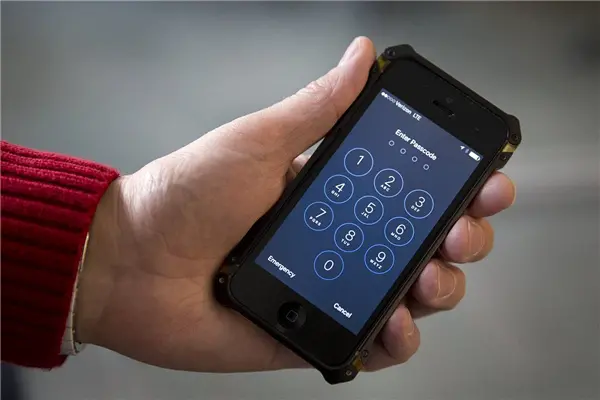A judge in New York sided Monday with Apple, a ruling that could affect a similar, much-watched case over a terrorist’s phone in California.PHOTO:ASSOCIATED PRESS/CAROLYN KASTER
(THE WALL STREET JOURNAL) A federal judge in New York sided Monday withAppleagainst the Justice Department, about whether the company can be forced to help investigators extract data from a locked phone—a ruling that could affect a similar,much-watched case involving a shooter’s phonein California.
The ruling, which could shape the broader battle about privacy, security and technology now being waged between Washington and Silicon Valley, comes a day before the head of the Federal Bureau of Investigation and Apple’s top lawyer are due to testify before Congress.
Magistrate JudgeJames Orensteinissued a 50-page order rejecting the Justice Department’s argument that the 18th century All Writs Act gives prosecutors the authority to compel Apple to help investigators bypass the passcode-protection system on an Apple iPhone seized in a drug investigation.
The decision could have a ripple effect in Congress and California, where a judge is weighing a similar request in a dispute about an iPhone used bySyed Rizwan Farook,gunman in December’sSan Bernardino attack, which killed 14 people.
In Monday’s ruling, the judge concluded that the government’s view of the 1789 All Writs Act is so far-reaching “as to cast doubt on [its] constitutionality if adopted.’’
He said the critical issues of 21st century privacy and technology should be decided by today’s lawmakers, not by reinterpreting an old law. “It would betray our constitutional heritage and our people’s claim to democratic governance for a judge to pretend that our Founders already had that debate, and ended it, in 1789,” Judge Orenstein wrote.
While the ruling is the first of its kind, it is certain to be reviewed by appeals court judges, and both sides are preparing for the issue to eventually reach the Supreme Court.
A senior Apple executive called the ruling thoughtful and cogent, and noted that Judge Orenstein rejected a demand by New York prosecutors that was less ambitious than what prosecutors are seeking in San Bernardino—suggesting that it may be even harder for the Justice Department to win in California. Apple is expected to file the judge’s ruling as an exhibit in the San Bernardino case.
A Justice Department spokeswoman said the agency was “disappointed’’ in the decision and plans to ask a district judge to review it. “This phone may contain evidence that will assist us in an active criminal investigation, and we will continue to use the judicial system in our attempt to obtain it,” she said.
The All Writs Act gives judges broad authority to order others to do what they say, and often is used to fill in gaps in existing laws. In the past, courts have used the law to compel phone companies to help agents track and monitor calls; force landlords to turn over security videos; and make credit-card companies provide customer records.
The ruling marks the first time a federal judge has rejected the Justice Department’s interpretation that current law allows investigators to force technology companies to help extract data from their customer’s locked phones or other devices.
Apple previously has assisted in dozens of similar situations, and the New York case marked a turning point—the company resisted such efforts, and the judge questioned the legality of what prosecutors were trying to do. There are anotherdozen known casesin which the Justice Department is trying to force Apple to help investigators extract data from locked iPhones.
In the California case, prosecutors want the company to write a specific piece of software that would disable certain security features on the phone, thereby enabling the FBI to guess at the passcode until they come up with the right combination. Under the current setup, the phone is erased after 10 failed password attempts.
The magistrate judge in the San Bernardino case,Sheri Pym,appears more sympathetic to the Justice Department’s arguments. She hasissued an order directing Appleto help investigators openMr. Farook’s phone,though she did so without hearing from the company andApple is contesting the order.
The Brooklyn case is different in that the government wants Apple to bypass the passcode so that investigators can retrieve some—but not all—of the data on the phone. Yet the two cases are linked by the broader policy debate and by the government’s use of the All Writs Act to try to compel Apple to help investigators.
Judge Orenstein devoted much of his ruling to prosecutors’ argument that because Congress largely has been silent on the issue of what companies, particularly technology firms, may be required to do to assist investigations, the All Writs Act authorizes them to compel companies to assist investigations.
Judge Orenstein disagreed. He was especially sharp in noting that Apple wasn’t being accused of any impropriety.
“Apple is not doing anything to keep law enforcement agents from conducting their investigation. Apple has not conspired with [the defendant] to make the data on his device inaccessible,’’ the judge wrote. “The government’s complaint is precisely that Apple is doing nothing at all.”
In seeking to use the All Writs Act in this way, Judge Orenstein said, the Justice Department is seeking to rely on judicial authority in an area where it is Congress’ responsibility to pass a law if it chooses.
“It is also clear that the government has made the considered decision that it is better off securing such crypto-legislative authority from the courts…rather than taking the chance that open legislative debate might produce a result less to its liking,” he wrote.
 简体中文
简体中文

